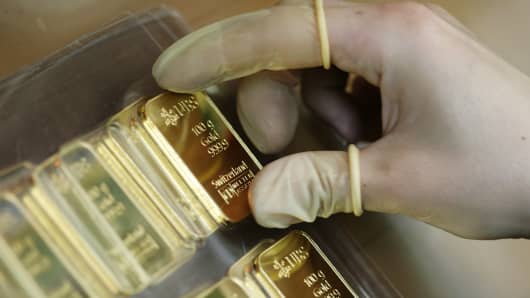The Central Bank of Cyprus has denied plans to sell 400 million euros ($525 million) worth of its gold reserves as part of its EU bailout deal.
While the mere idea of a eurozone country liquidating its gold holdings has spooked the market in recent days, analysts have told CNBC it isn't such a big worry.
Gold hit its lowest level in a week on Thursday on worries about the potential Cyprus sale and as Wall Street banks turned more bearish on bullion.
European Commission documents published by the Financial Times showed Cyprus would commit to selling a majority of the gold held by its central bank as part of an international bailout.
(Read More: El-Erian: Unfortunately, the Cyprus Crisis Is Not Yet Over)
That raised fears that other heavily indebted peripheral euro zone countries might be forced to do the same.
Cyprus holds just 13.9 tonnes of gold, worth around 585 million euros, compared to 4,800 tonnes held globally. Under the draft EC plan,the country would sell 400 million euros ($525 million) worth of bullion or round 10 tonnes, a small amount by global standards, but still potentially the biggest bullion sale in Europe since 2009
Struggling euro zone members, Italy and Portugal have much larger gold holdings, and investors are worried that if they followed suit it would really roil the market.
"This would only become a major concern if countries with much larger holdings were forced to sell. However, among the other troubled euro zone members, only Italy and Portugal hold significant amounts of gold relative to their borrowing requirements," said Julian Jessop, head of commodities research at Capital Economics.
(Read More: Mystery Deepens: Has Cyprus Extended Capital Controls?)
There would also be significant political and legal obstacles, which may yet prevent even Cyprus from selling its gold, but the most important barrier is simply the weight of public opinion, said Jessop.
"At most, gold might be used as collateral for some government debt (an idea being promoted by the World Gold Council). However,the chances of large outright sales are very slim," he added.
BlackRock's Olivia Ker, who covers gold and mining sectors on the firm's natural resources equity team said there is concern about the possible contagion effects of Cyprus' actions on other euro zone countries.
But, she added, the EU treaty bans sales of central bank gold reserves in order to finance deficits.
"Gold reserves are held by central banks and it is actually forbidden under the EU treaty to directly finance government borrowings with central bank gold reserves, so it would be a big step if a country like Cyprus were to sell their gold reserves," she said.
There's another wrinkle, according to the analysts. If the euro zone crisis was so bad that governments were forced to sell their gold holdings, it might also spur investor demand fora safe-haven asset like gold.
(Read More: Why Gold Will Continue to Underperform)
"If the crisis elsewhere in the euro zone escalates to the point where other, larger countries were desperate enough to consider selling their own gold, demand for safe havens would surely be so strong that there would be plenty of willing buyers – even at higher prices," said Jessop
James Sutton, client portfolio manager on J.P. Morgan's natural resources fund said more central banks are buying gold rather than selling, so there would be no shortage of potential buyers if Cyprus were to sell.
"If Cyprus were to sell it would not move the needle. Compared to Portugal and Italy, Cyprus is in an incredibly weakened position and the ECB would never let them get to that stage," he said.


